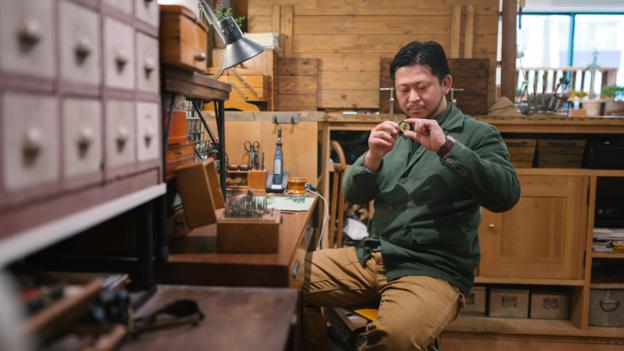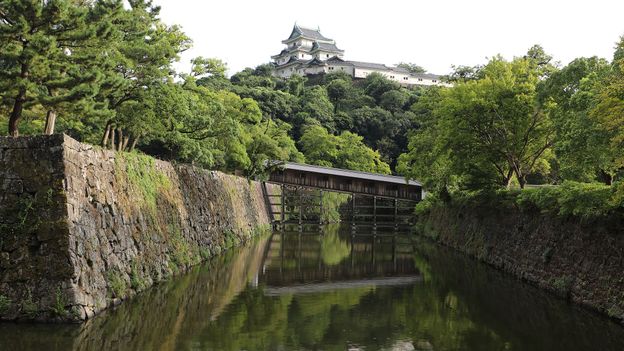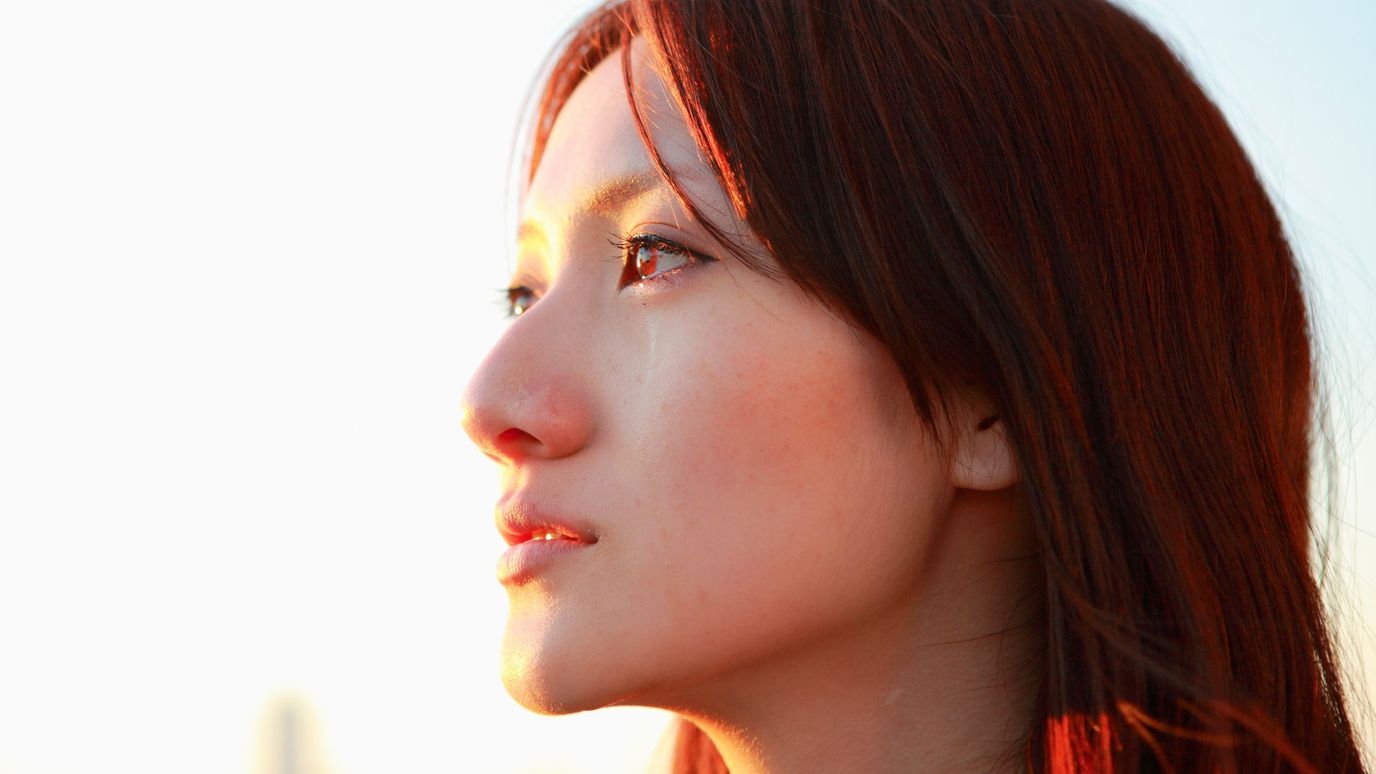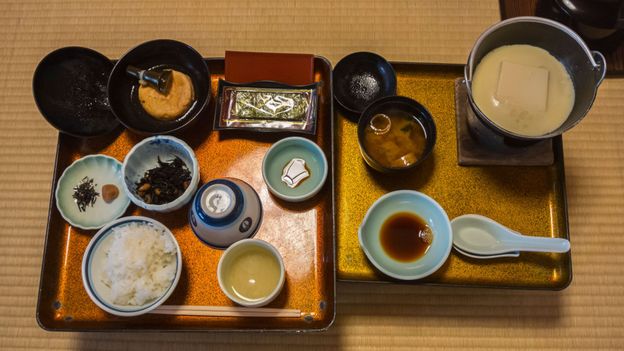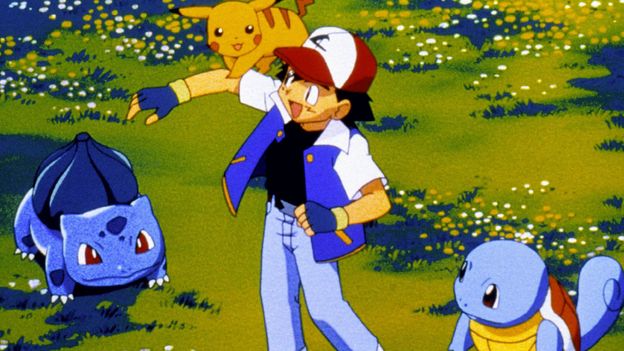Stretched out across the seat on the late-night train, fast asleep and far from the sounds of his ringing phone, the man opposite me was oblivious to the hard stares of his neighbouring passengers. This was no drunk student returning from a night out, however. His smart suit may have been dishevelled and his polished shoes abandoned on the floor (a habit impossible to shrug off even in the depths of drunkenness), but he was a salaryman, and a seemingly successful one at that.
Our coverage during coronavirus
While travelling is on hold due to the coronavirus outbreak, BBC Travel will continue to inform and inspire our readers who want to learn about the world as much as they want to travel there, offering stories that celebrate the people, places and cultures that make this world so wonderfully diverse and amazing.
For travel information and stories specifically related to coronavirus, please read the latest updates from our colleagues at BBC News.
This is a common sight when exploring Tokyo late at night: the sprawled-out bodies of corporate workers can be found draped across benches, slumped in doorways and dotted around train stations. Their incongruous forms have been popularised on Instagram accounts and captured by photographers, feeding the world’s curiosity. Working long hours and encouraged to go drinking with colleagues after leaving the office, many miss trains home and spend the night on the street instead. While initially comical, their perpetual presence is a disquieting reflection of a nation obsessed with work.
Even to visitors, the sight of a sleeping salaryman soon becomes normal. But when paired with octogenarian taxi drivers, ever-present convenience store workers and rush hours lasting well into the night, Japan’s pervasive work ethic becomes disconcertingly apparent. While economic factors play a heavy role, the concept of ikigai may well be at the core of Japan’s work-life imbalance – as well as the key to fixing it.
If you worked for your company, you were very strongly urged to make the company your ikigai
Formed by combining “iki”, meaning “life”, and “gai”, meaning “to be worthwhile”, the term is a succinct way to describe what gets you up in the morning – be it work, family or a well-loved hobby – much like a prosaic version of the French term raison d’être.
“It’s something you live for,” explained ex-corporate worker Masataka Shintoku, simply, when asked to define the ancient term. “If you have a great time when you are working, it could be ikigai. If you have a family you love and you can do something for, it’s also ikigai.”
However, while a burst of international attention has seen the term appear on lists of inspirational, untranslatable words, its homeland is struggling to unite concept and reality. The disconnect between the discovery of a deep motivation that makes life worth living and the reality of 14-hour days in front of computer screens seems stark, but not entirely unfathomable, when seen in context of Japan’s drastic 20th-Century development.
Dating back as far as the 14th Century and long considered role-focused due to the hierarchical nature of society, the term was returned to the modern spotlight with Natsume Soseki’s novel, Kokoro, which was serialised in 1912. Meaning “the heart of things”, the tale followed a student’s journey of self-exploration with the support of an aging mentor. Published in the final year of the Meiji era, as Japan emerged from isolationism and embraced the international, industrial world, Kokoro piqued the interest of a nation embracing a new way of life.
You may also be interested in:
• Japan’s unusual way to view the world
• A country obsessed with the past
• Is this Japan’s best breakfast?
Towards the middle of the century, World War Two brought with it a return of survivalist and role-related focus. Soon after, however, Japan entered a new age of growth known as the “economic miracle”. Offering affluence and increasingly extended life-expectancy, the newfound freedom allowed the topic of ikigai to return to the forefront of popular debate.
While countless studies and articles mulled on its meaning in the public eye, the term was quietly being co-opted for the greater cause. Gordon Mathews, professor of anthropology at The Chinese University of Hong Kong, notes that by providing certain limitations or rewards, societal institutions are able to “‘encourage’ the individual down one ikigai path instead of another”, thereby shaping their pursuit to fit the needs of society.
In an age of economic success, increased work output was key. “There was a lot of ikigai pressure,” explained Mathews. “If you worked for your company, you were very strongly urged to make the company your ikigai, and if you didn’t, there was something wrong with you.”
Although it may seem too easy an exploitation of the concept, the framing of work as ikigai, in fact, draws on one of the more traditional interpretations of the term. Known as ittaikan, the idea of fulfilment derived from “commitment to one’s group” appeals to the Japanese sense of wa (harmony). Japan’s economic success and the re-emergence of a corresponding interest in a personal ikigai blossomed simultaneously, soon becoming irreversibly entwined and placing men in the office, women in the home – and shaping the work-life balance for decades to come.
This requirement for men’s professional prioritisation was paired with a unique work structure that valued not only company loyalty but input factors such as time and effort over output factors like results or progress. Long hours and sacrificed leisure time were (and still are) seen as positive virtues, while the “ganbaru” trait – meaning “trying hard” – is valued above all. While not limited to salarymen, these attributes soon became an embodiment of the working ideal, dedication included.
This is not to say that dedication was limited to white collar roles, however, nor was it a new expectation. From chefs to craftsmen, perseverance in a chosen field has always been highly respected in Japan. Whether you’re selecting a hobby or are a young student choosing a career, a singular focus is encouraged early on – a value reflected in the highly specialised nature of shops and restaurants across the country. Be it a tiny hole-in-the-wall joint offering smoked ramen or a store selling nothing but freshly baked sweet potato, you can trust that the chefs involved are entirely focused on perfecting their chosen dish.
As Japan has become poorer, it’s probably become happier and more ikigai-enhancing
Likewise, the skills of craftsmen are passed on from generation to generation, often resulting in their family name becoming synonymous with the quality products they create. A pair of scissors from Tokyo’s Ubukeya is crafted with more than 200 years of collective experience, while Kyoto’s knife makers, Aritsugu, can trace their history to the 16th Century. Admittedly the quality of dedication in itself is not unique to Japan, but the incredible number of artisans – from those continuing centuries of experience to those just starting out – reflects the immense value placed on devoting your life to a single craft.
Although the traditional working environments remain strict in terms of hours and available leave, the economic downturn has opened up new opportunities. Those seeking to combine ikigai with work are now considering unconventional roles in start-ups, as freelancers or doing remote work, and co-working spaces are flourishing in Tokyo.
“Today there’s a different Japanese world, and there’s more freedom for people to find their own ikigai in a variety of different ways,” Mathews explained. “As Japan has become poorer, it’s probably become happier and more ikigai-enhancing as a society because there are more patterns by which to live.”
While the balance is by no means at an ideal level in Japan, as demonstrated by the dedicated sushi-chefs still working seven days a week and the increasing numbers retirees retraining as security guards, park officers and museum guides, it is certainly improving when it comes to opportunity.
In the last few years, there’s been a new awareness of individual value: with job-hopping no longer the taboo it once was, according to The Japan Times, workers are free to seek out their ikigai in new roles, combining skills and broadening their focus. This option isn’t purely open to corporate workers either; while they remain the poster boys of overwork, the culture has influenced all corners of working society.
Ayuko Kokado, who worked as an English teacher for 20 years before opening one of Japan’s first cookery schools in 2011 explained: “I was working six or seven days a week, very long hours. Sometimes as a full-time teacher you just have to be there. It’s a very typical Japanese style of working, but it’s very stressful.”
While she loved teaching, she saw a way to combine it with her other passions of food and travel, escaping the limited confines of her full-time position. Now a qualified sushi and sake instructor, she welcomes students from around the world at Buddha Bellies Cooking School while also travelling to work as a private chef. Relishing the freedom and opportunities, Kokado believes this multi-faceted approach to a career is key to balancing work and ikigai: “Ikigai shouldn’t be fixed. If you fix it, you can push yourself too much and lose the passion. If you have a variety of skills, you can be flexible and continue for longer – that’s my style of ikigai.”
As the younger generations begin to untangle the connections between true ikigai and work, reforming them for their own interpretation, it seems a more balanced future might be possible for Japan’s work-life struggle.
Why We Are What We Are is a BBC Travel series examining the characteristics of a country and investigating whether they are true.
Join more than three million BBC Travel fans by liking us on Facebook, or follow us on Twitter and Instagram.
If you liked this story, sign up for the weekly bbc.com features newsletter called “The Essential List”. A handpicked selection of stories from BBC Future, Culture, Worklife and Travel, delivered to your inbox every Friday.

